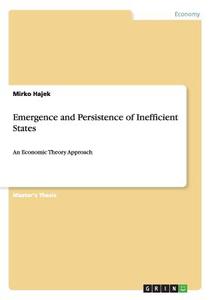
Emergence and Persistence of Inefficient States
An Economic Theory Approach
- Editore:
GRIN Publishing
- EAN:
9783668051645
- ISBN:
366805164X
- Pagine:
- 92
- Formato:
- Paperback
- Lingua:
- Tedesco
Descrizione Emergence and Persistence of Inefficient States
Master's Thesis from the year 2014 in the subject Economics - Other, grade: 1,0, University of Leipzig (Institut für Theoretische Ökonomie), course: Masterarbeit, language: English, abstract: Bureaucratic inefficiency, patronage-induced overstaffing, and outright corruption retard economic development and reduce public well-being in developing countries. They prevent governments from effectively carrying out the economic plans to which they devote so much official attention, and deprive citizens of government services to which they are legally entitled. (Geddes 1991, p.371) Corruption, patronage and inefficient bureaucracies are widespread in many countries and under all forms of government. Whereas such problems are often recognized to be at the core of rent-seeking regimes like dictatorships or oligarchies, they occur in similar ways in developing and even in developed democracies. For instance, there is evidence for bureaucratic inefficiency, corruption and patronage in Brazil (Weyland 1996), but also in Germany (Braendle 2012) and France (Facchini and Melki 2013). A rich body of research however underlines the importance of good institutions as main determinants of economic development, growth and prosperity. But why and under which conditions do some societies choose inefficient institutions? This is the main question the thesis seeks to answer. A related second question concerns a possible explanation for the setup of inefficient institu- tions: Why do democracies often pursue relatively elite-biased policies contrary to the predictions of the median-voter-theorem? As Acemoglu (2010, p.1) notes, institutions are often ¿structured to maximize the rents captured by the elite, the individuals or social groups monopolizing political power". In electoral democracy, the influence of different social groups should be closer related to their population share than in nondemocracy. However, the distribution of political power can by diluted if institutions reshape political influence and redirect government spending towards the top. The thesis tries to bring together the two issues by elaborating a possible explanation for the link between the emergence of inefficient institutions and the prevalence of pro-elite policies.














